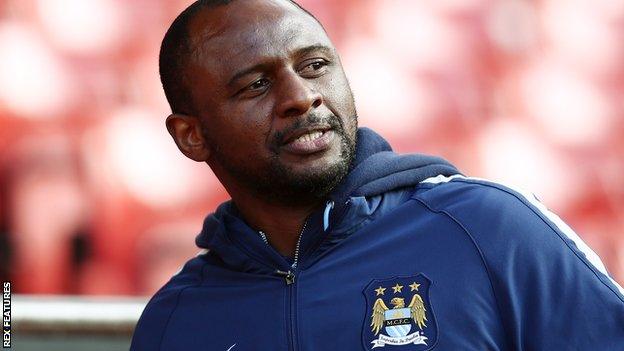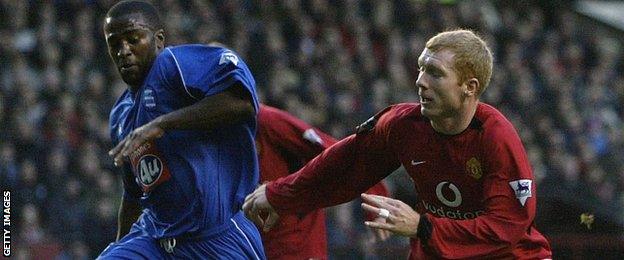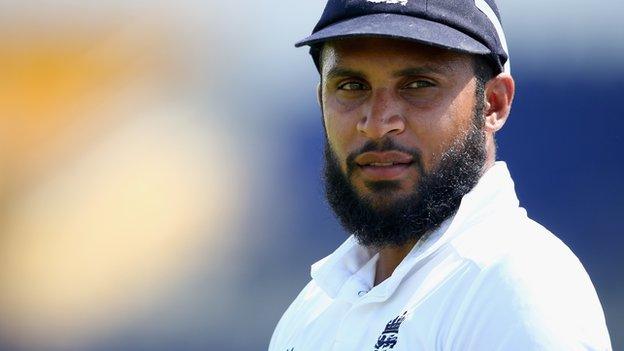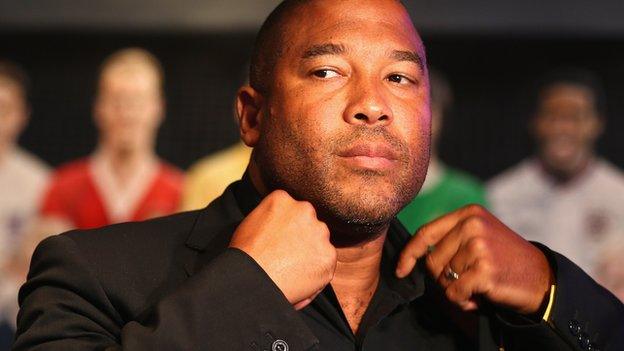Black managers: 'Thirty years before equality' - report
- Published

Manchester City academy director Patrick Vieira has been tipped to become a future top-level manager
It could be 30 years before black and minority ethnic (BME) managers are properly represented in English football, according to a new study.
The second Sports People's Think Tank, external report found 23 out of 552 elite coaching roles are held by BME people.
That is just 4% of the available positions, despite 25% of players being from BME backgrounds.
Former Reading striker Jason Roberts said it was due to "unconscious bias" at best or "possibly racism" at worst.
There are six black managers at the 72 Football League clubs.
Ex-Blackburn and Wigan forward Roberts, 37, is a founding member of the think tank and told BBC Sport there was a lack of "urgency" from the "footballing family" in addressing the issue.
Dr Steven Bradbury, of Loughborough University, carried out last year's inaugural study,, external which found there were just 19 BME managers and coaches at elite level across all 92 professional football clubs in the English leagues.
He calculated the "slow" rate of increase in 12 months meant it would be 31 years before the figures accurately reflected the number of BME players currently in the game.
The report concluded, for a second year running, that "a form of institutional discrimination" continues to limit opportunities for BME coaches., external
Some of the BME managers and coaches | |
|---|---|
Chris Hughton | Manager, Brighton & Hove Albion |
Chris Powell | Manager, Huddersfield Town |
Chris Ramsey | Manager, QPR |
Jimmy Floyd Hasselbaink | Manager, Burton Albion |
Keith Curle | Manager, Carlisle United |
Ricardo Moniz | Manager, Notts County |
Terry Connor | Assistant manager, Ipswich Town |
John Salako | Head coach, Crystal Palace |
Patrick Vieira | Head of the elite development squad, Manchester City |
Key findings from the report
The report, which will be presented to the All-Party Parliamentary Football Group at Westminster on Wednesday, classes senior coaching positions as anything from a manager through to an under 18s coach.
It found:
18 of 92 clubs (20%) employ a BME coach in a senior position
Barriers to BME coach progression remain and include "conscious and unconscious racial bias and stereotypes"
There is a "consequent lack of BME role models at all levels"
It will monitor the "upward career mobility" of a number of other BME coaches in less senior roles such as Richard Shaw at Crystal Palace, Eddie Newton at Chelsea, Ledley King at Tottenham, Darren Moore at West Brom and Michael Johnson at Cardiff

Jason Roberts agrees with former England international Viv Anderson that he will not see a black England manager "in his lifetime"
Football is not doing enough, says Roberts
Roberts said he understood "things don't change overnight", but argued not enough has been done to "challenge the decision-makers" over a "structured exclusion of a minority in football".
"When you're a black player and you're coming to the end of your career you think, 'well there's no opportunity for me as a manager', and the statistics only prove that," said Roberts. "I believe because of it we're losing potentially top managers and top coaches."
Former Birmingham defender Michael Johnson, who had to wait four years before successfully interviewing for a role with Cardiff City's academy this year, agrees, adding: "The networks are closed off.
"Predominately football is run by white, older men, so you seem to gravitate to what you have found is the norm."
"I couldn't get any more qualified. But I was out of work from August 2011 to August 2015.
"My main challenge was getting to the table to show people what I'm about. "

Michael Johnson said he had to wait four years for a coaching role in professional football
What is being done?
The Football League is set to vote on bringing in a version of American football's Rooney Rule, external at its 2016 annual general meeting.
It would see clubs interviewing one BME candidate for each head coach or manager role from next season.
Professional Footballers' Association chief executive Gordon Taylor has previously said football has a "hidden resistance", external preventing black managers getting jobs.
Speaking about the Rooney Rule, Johnson added: "Hopefully this will start to make things easier for talented black managers, who are qualified to get in front of chief execs and chairmen, just to show they are capable of doing a fantastic job."
What is the Rooney Rule? |
|---|
The Rooney Rule was established in 2003 and named after Dan Rooney, owner of the Pittsburgh Steelers and the chairman of the NFL's diversity committee. It requires NFL teams to interview at least one black or ethnic minority candidate for head coaching and senior football operation opportunities that become available, as part of a transparent and open recruitment process. |
The Football Association said it has endorsed "the principles" of the Rooney Rule in its own hiring processes, and board member Heather Rabbatts urged clubs to "shift the culture of closed network of recruitment" by "embracing the practice of shortlisting and interviewing BME coaches and managers with the requisite qualifications".
The FA is spending £1.4m over five seasons on BME coaching bursaries, including working with England development teams, while the Premier League has made additional places available to BME applicants on its elite coach apprenticeship scheme to help develop world-leading coaches.
- Published20 October 2015

- Published20 October 2015

- Published16 April 2015

- Published20 June 2016

- Published7 June 2019

- Published2 November 2018
